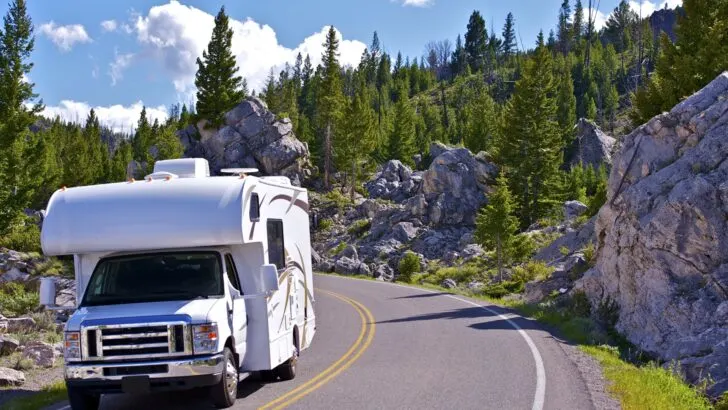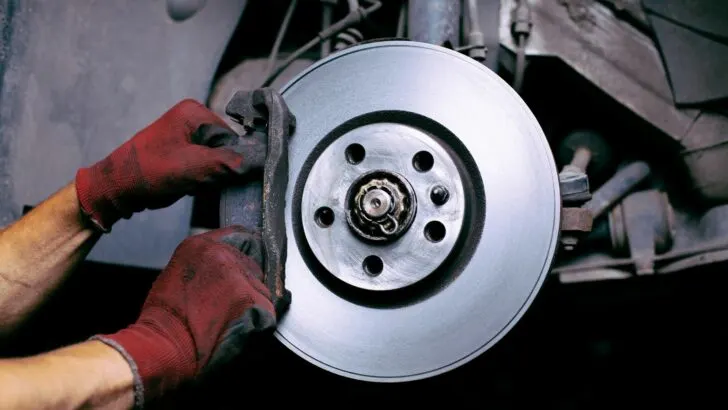“How long do RV brakes last?” may seem like a simple question, but the lifespan of RV brakes can vary a lot. The type of RV you have, how much it weighs, and where, how, and how often you drive it can have a major impact on how long the brakes will last. Today’s post covers RV brakes and the factors that affect their lifespan, helping you keep your RV’s brakes in good working condition for longer.
How Long Do RV Brakes Last?
How long an RV’s brakes last can be affected by many factors, such as RV class and weight, brake type and manufacturer, brake usage, maintenance, and environmental conditions. Driving location (mountains vs. prairies, for example) and driving style (a good defensive driver vs. someone lacking those skills) can also have a big effect.
By understanding what keeps brakes lasting longer and taking steps to properly care for your rig’s braking system, you can increase the longevity of your brakes, as well as the safety and reliability of your RV on the road.
Because brake life can vary so widely, quoting a specific number or range may be totally different from one RV to the next, and one owner to the next. Rather than identify a specific range of miles that a specific RVer should expect to get from their brakes, we’ll focus on things you might do to increase the lifespan of your RV’s brakes.
Let’s take a look at the factors to be considered:
Typical RV Use
How and where you use your RV can impact the lifespan of your brakes. How many miles you drive, the types of roads you tend to travel, their grade and condition (mountains, flat highways, back roads, off-road, cities), and how frequently (and how hard) you apply your brakes all contribute to wear & tear.
Do you spend a good percentage of your RVing time in the mountains? If so, what type of braking system enhancements is your RV equipped with? For example, our ’05 Newmar, which was the 2nd RV we owned and full-timed in for more than 18 years, is equipped with a stellar 2-stage engine brake.
That system provided such powerful braking authority that virtually no mountain descent required much (if any) use of the brakes. Only the steepest grades even required the “High” setting. As a result, our extensive travels through the Mountain West had virtually no noticeable effect on our brake’s lifespan (not to mention the positive effect on our heart rate)!
How about city driving? If you tend to stay away from busy cities (as most of us probably do in our RVs), dealing with less stop-and-go traffic is certainly easier on your brakes, too.

How and where you drive your RV has an impact on the lifespan of your rig’s brakes.
Also, driving your rig in snowy or salty conditions or spending most of your time near the ocean can impact your brakes due to the increased potential for rust and corrosion.
Even the surface where you park your rig can have an impact on the lifespan of your brakes. If you usually park or store your rig on grass, for example, moisture from the ground can contribute to rust and corrosion on many components, including the brakes.
Weight Of Your RV
Your RV’s weight can also impact brake life. The more a rig weighs, the more wear the brakes may experience. Of course the bigger the rig, the bigger the brakes, but mass is mass! Slowing a heavier weight requires scrubbing off more energy than slowing a lighter weight.
That said, a light travel trailer might still require brake replacement earlier than a heavy diesel pusher. Again, that can be largely due to the considerable size of Big Rig brakes, and the benefit of systems like engine brakes, which aren’t available on travel trailers.
One thing is for sure — if you take a specific motorhome or travel trailer and test the braking power required to bring each of them to a stop, an empty/unloaded RV will require less effort/energy to stop than the exact same rig when loaded to its GVWR (gross vehicle weight rating).
So, if you want to help your RV brakes last a bit longer, leave heavy gear at home if it’s not something you actually use.
Type of RV Brakes
Like those on other vehicles, RV brakes use friction to slow down or stop the rig’s motion, but RVs have different types of brakes. Many modern RVs are equipped with hydraulic disc brakes, but some models still use drum brakes.
Disc brakes tend to have better heat dissipation, improved braking performance, and less/easier maintenance. However, the need for maintenance can also vary based on the type of usage. Electric trailer brakes can wear faster if the gain/setting on the brake controller in your towing vehicle isn’t calibrated properly.
Motorhomes like our 43′ Mountain Air and other big diesel pushers are typically equipped with very robust air brake systems. Combined with the availability and effectiveness of an engine brake or exhaust braking, they tend to last a long time. But there’s a caveat to that which we’ll get to below: driving habits.
So, the type of brakes your rig has can impact lifespan considerably.
Maintenance
Like so many RV systems, proper maintenance of your RV’s brake components can significantly impact their lifespan. For example, if your rig has hydraulic brakes, you’ll want to periodically inspect the rotors, brake pads, drums, and linings, as well as the master cylinder and, of course, the fluid level. Brake pads should be inspected for even wear, and any rust or corrosion.

Brake pads should be routinely inspected for remaining brake material and even wear.
If you have a motorhome with air brakes, you’ll need to replace the desiccant can that absorbs excess moisture. That cartridge protects the entire air system and should be replaced according to the schedule in your RV or chassis owner’s manual.
Towable rigs can have hydraulic or electric brakes, and both require different types of maintenance. For more information on brake systems for towable RVs, check out our posts on trailer brake systems, the best trailer brake controllers, and tow-haul mode.
It’s important to follow and record all recommended maintenance for your RV. In our post on RV maintenance spreadsheets, we covered the RV Life Maintenance Tracker for staying on top of important tasks. You’ll need RV Life Pro to get the Maintenance Tracker, so be sure to use our RVgeeks coupon.
RV Life Pro membership provides access to a suite of valuable tools (each one separately worth the cost of the whole package), including: RV Trip Wizard (trip planner); RV Safe GPS app (for...Show More
RV Life Pro membership provides access to a suite of valuable tools (each one separately worth the cost of the whole package), including: RV Trip Wizard (trip planner); RV Safe GPS app (for RV-specific navigation); CampgroundReviews.com (user reviews of RV Parks & campgrounds); iRV2.com (community forums); RV Life Maintenance Tracker (maintenance schedule tracking), and RV Masterclass (excellent educational material for all RVers).
Read Our Post All About The RV Life App
Save 25% on your first annual subscription to RV Life PRO by clicking the button. The discount will be applied when you click through to the payment page. Show Less
RV Driving Habits
When it comes to helping your RV’s brakes last a long time, driving style is one of the most important (but possibly less-mentioned) factors. If you’re not following best practices in his area, correcting the problem is free!
Do you tend to follow the vehicle in front of you too closely (tsk, tsk!) leading you to sometimes have to brake suddenly? If so, then your driving habits are likely to cause you to need to replace your RV’s brakes more frequently than necessary.
Two of the core practices that good defensive drivers follow help in many ways, including longer-lasting brakes:
Defensive drivers don’t tailgate. Operators of larger/heavier vehicles like motorhomes or those towing a trailer need to maintain a greater following distance than a passenger car does — a minimum of 4 seconds behind the vehicle ahead in ideal conditions, six seconds on wet roads or at night, eight seconds on snowy roads, and ten seconds on icy roads.
These following times work at any speed and do not require trying to guess distance in feet or car lengths. Just watch the vehicle in front of you pass an object or shadow, and count “one one thousand, two one thousand” etc, until you reach the same object.
With practice, following at a safe distance will become automatic, no matter the conditions. Of course, your speed will decrease as conditions deteriorate, but again, following distance based on time works at any speed.
- Defensive drivers look far ahead. Part of your routine scan while driving should include what’s happening way out in front of you. A brake check 1/2 mile ahead can provide lots of time to begin slowing down gradually… but only if you see those brake lights coming on.
Following the two practices above will allow you the space and time to decelerate without heavy braking. Obviously, allowing your RV to slow gradually, rather than braking hard at the last second, will reduce brake wear, and also keep you safer and your passengers more comfortable.
Adhering to these types of defensive driving practices for the 18+ years we owned our Mountain Aire paid real dividends. Despite putting on more than 113,000 miles, we never had to make a panic stop a single time. Not. Once. Ever.
Even if we were to count the number of somewhat firm stops we had to make over all those years, we could do it on one the fingers of one hand, with at least several fingers left over. Every driver should learn and practice proper defensive driving techniques for so many reasons.
When we sold our rig, the brakes still had plenty of meat on the original brake pads.
Environment/Weather Conditions
We touched on this earlier, where we noted the impact of moisture, salt, and other environmental conditions. If your RV is stored outdoors in the desert sun, high temperatures and UV rays can break down components. Likewise, a cold and wet environment can have a similar impact for different reasons.
Whenever possible, using and storing your rig in the best possible conditions will prevent brakes and other components from requiring replacement earlier than necessary.
Quality of Components
Finally, the quality of the components used in the braking system of your RV can significantly impact the lifespan of your RV brakes. OEM (Original Equipment Manufacturer) parts or high-quality aftermarket replacements are generally more durable and reliable than cheaper alternatives.
Brakes are no area to skimp. Investing in quality brake pads, rotors, and calipers may initially cost more, but they can potentially save money in the long run by reducing the frequency of replacements and minimizing the risk of brake-failure-related accidents.
The best way to keep your RV’s brakes performing safely and optimally and to extend their lifespan as much as possible is to focus on regular inspection and maintenance and to drive defensively so sudden or hard braking is less common. And don’t forget to jettison unnecessary weight, too.
Free RVing Tips, Tricks, Reviews & Giveaways
As 20-year full-timers, we share everything we’ve learned about RVing over the years. Join our online community to receive a wealth of great RVing knowledge delivered daily to your inbox.
Whether you’re a new RVer or a seasoned full-timer, you’ll love the wide range of RVing topics we cover. Don’t miss a single article or any of our famous Giveaways. Subscribe to our newsletter today!


